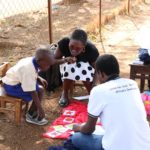Country
Year
Assignment
Funding
Theme
Scope of Gender analysis
The ultimate aim of the DANBE project is for adolescent girls and women in the Ségou and Sikasso regions to exercise their right to appropriate health services and a life free of violence. As part of the project’s implementation, IMC commissioned a Gender Analysis to produce qualitative information to help understand the situation of adolescent girls’ sexual and reproductive health and rights (SRHR) in the intervention zone, as well as gender-based violence (GBV), the contemporary reality of women in these areas, the causes of GBV,and its impact on community members, especially women and girls.
Methodology of Gender analysis
Armel Oguniyi, Founder at ar-mel directed the assignment as the lead consultant. In a participatory, inclusive and gender-sensitive approach, the analysis was based on a qualitative method, which combined primary and secondary sources of data collection. The four main areas of gender analysis (Roles and Responsibilities; Access to and Control of Resources; Participation; Social and cultural norm) guided the development of the analysis questions and data collection tools. The Active Participatory Research Method (APRM) was used to conduct the gender analysis and draw conclusions in collaboration with stakeholders at various levels. In addition, the study adopted an inclusive gender-sensitive approach, inscribed in the dynamics of conflict.
Outcomes of Gender analysis
In the light of the impact themes identified in the gender analysis, the study highlighted the current inequalities, risks and opportunities for women and adolescent girls, around the implementation of DANBE project activities in its intervention regions. Rape, physical violence, forced marriage, denial of resources, opportunities or services, and psychological and emotional violence persist in the target localities despite the multiple actions implemented by the government, its partners and international and local organizations. Girls and women continue to be marginalized. To improve this situation, realistic and realisable recommendations have been put forward.





